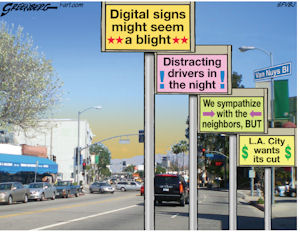The city of Los Angeles must take swift action to reject a court ruling that would cost the city and local businesses hundreds of thousands of dollars. At a time when layoffs are being considered and the budget crisis has ballooned out of control, city officials cannot afford to rest on their laurels and allow the court to dictate their contracts. In 2006, the city of Los Angeles entered into an agreement with two outdoor advertising companies to allow 80 percent of conventional billboards to be removed, in exchange for the option to convert the remaining signage to digital billboards. A third company filed suit against the City and its agreement. This company, Summit Media, states that they were unfairly left out of the process. The court ruled in favor of this company, forcing the digital conversions from CBS Outdoor and Clear Channel Outdoor to come to a screeching halt. This decision has been heard by an appeals court and on October 30 of this year, a three-judge panel issued a tentative ruling that could strike down the deal made by the city. If the city refuses to take action and supersede the impending court ruling, hundreds of signs that are already standing could be forced to be torn down. These are signs that were built with the reasonable expectation that the investments made by CBS Outdoor and Clear Channel Outdoor would be protected. A final decision is expected to be issued within 90 days. This short time-frame means that the Los Angeles City Council must act quickly to preserve the investments of the companies and a source of city revenue. Notoriously a difficult place to do business, Los Angeles is setting itself up to be considered a dangerous place to do business. By not responding to this ruling, the city is giving businesses a reason to fear that entering into a valid contract with the city provides no protection of their investment. Allowing the court to revoke permits for construction work that has already been completed is a huge cause for alarm among Los Angeles businesses. An important step in regaining the trust of those who drive the region’s economy will require the city to directly address the case that caused the dilemma. It must be made clear that the city’s charter allows it to settle ligation, noting that city law supersedes state law in municipal matters. This means that the city can lawfully uphold its agreement with the outdoor advertising companies. The Valley Industry and Commerce Association (VICA) urges the Los Angeles City Council to move forward with their agreement and allow the digital conversions to remain in L.A. These digital billboards would solve many of the problems with the city’s billboards held by residents. Homeowners who want to see fewer billboards would be appeased by the removal of four out of five billboards. More importantly, however, allowing CBSOutdoor and Clear Channel Outdoor to continue their digital conversions would bring in much-needed revenue for the city. The Los Angeles City Council would be wise to move forward with the business agreement, reject the settlement and lay out a plan to regulate the digital signs. A main concern for neighborhood activists is the glare from digital billboards. These signs should be permitted to include automatic sensors that can increase or decrease the brightness based on the sun rising or setting and account for fog and precipitation. VICA believes that if a candela (brightness) requirement must be set, rather than allowing for these sensors, the daytime display limit should be no less than 9000 candelas. This will allow the signage to compete against direct sunlight. It is unconscionable for the city to miss the opportunity to bring in revenue by not moving forward with their agreement. This is an opening for Los Angeles to help solve its budget crisis and save city jobs. As the time for action is clearly dwindling, city businesses, communities and workers need the Council to come forward and uphold their agreement with CBS Outdoor and Clear Channel Outdoor. In doing so, the Council will give the business community faith that agreements with the city will not end with loss of investments and revenue. Email your responses or thoughts about the column to [email protected].
